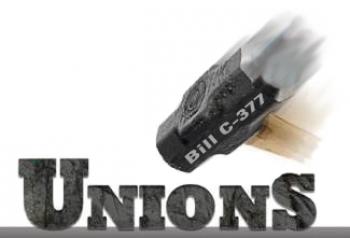MPs fired their opening shots Friday in the first hour of the final House of Commons debate on Bill C-377.
The private member’s bill, which would force unions to submit extremely detailed financial information to the government for public display, has undergone a facelift since it was last trotted through the house by MP Russ Hiebert. Last week, following several weeks of study of the bill by the finance committee, Hiebert tabled several amendments.
Many of the changes are aimed at addressing serious concerns raised over the privacy implications of the bill.
“Pension plans, health benefit plans, and other regulated plans will not be required to report under C-337,” said Hiebert in the House, “and benefit payments to individuals from such registered plans will not be reportable.”
His amendments also remove the requirement for labour organizations to publicly report the addresses of employees. (The names of those earning salaries of $100,000 or more would still be publicly disclosed.)
His changes would also allow for electronic filing of reports and would simplify the way these reports are displayed online by the Canada Revenue Agency (CRA). These and other changes, he said, would cut the government’s cost of administering the reporting regime, as estimated by the CRA last month, by one-quarter to one-half.
But the amendments still leave many serious problems intact, say the Opposition.
NDP labour critic Alexandre Boulerice challenged Heibert’s suggestion that costs to implement the new law would be minimal.
“The CRA said $2 million in the first two years, and then $800,000 after that — that was for 1,000 reports,” said Boulerice. “But the Parliamentary Budget Officer in his assessment said there would be 18,000 organizations affected.”
The Canadian Bar Association has come out very strongly against Bill C-377. If one reads the association’s criticism of the original bill alongside the newly made-over version, it seems there are some serious legal problems that have not been resolved by the amendments.
Consider, for example, the question of how benefit and pension plans would be affected.
In a letter to the House of Commons finance committee dated November 23, the Canadian Bar Association listed the types of organizations which, at a very minimum, would need to be specifically excluded from the reporting requirements of the bill to ensure the law will not adversely impact employee benefit plans. (The association was careful to point out that, in providing these suggestions, it was by no means endorsing the bill, which “remains fundamentally flawed” and “should not be adopted, even with these proposed changes.”)
The letter lists eleven distinct types of legal entities (the definition of which takes up nearly a whole page) that would need to be excluded.
Mr. Hiebert’s amendments have excluded only two.
Other concerns not touched by the amendments include possible constitutional challenges due to the bill’s intrusion into provincial jurisdiction over labour regulation, and its excessive interference with the administration and operations of unions.
Bill C-377 will have another round of debate in the House of Commons before it reaches final reading and a vote by MPs. That could happen as early as next week, or as late as next February.
Lori Theresa Waller is rabble.ca‘s labour reporter.



